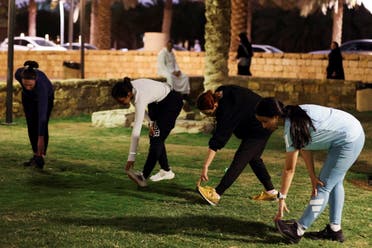Ramadan 2024: 10 helpful tips to stay active, prevent weight gain during the month

Ramadan marks the month when Muslims around the world refrain from eating and drinking from sunrise to sunset, which aims to help promote self-discipline, empathy for the less fortunate, and spiritual growth.
The duration of fasting hours during Ramadan varies depending on geographical location and the time of year and can range from 11 hours up to 18 hours or more.
Staying active during the month can be difficult for some as they try to navigate their daily routine without any food and drink and low energy levels.
Here are 10 helpful tips to stay active and prevent weight gain during Ramadan:
1. Exercise during non-fasting hours:
Schedule your workouts during non-fasting hours, such as after Iftar or before Suhoor. This will allow you to replenish your energy levels with food and water before and after your workouts.

2. Opt for low-impact activities:
Choosing low impact exercises is a great way to prevent over-exerting yourself. Examples of low-impact workouts include walking, yoga, stretching, and swimming.

3. Split your exercise sessions:
If engaging in longer workouts is too challenging during Ramadan, then break up your exercise session into shorter intervals throughout the day.
Brief bouts of physical activity can still be beneficial for maintaining mobility and energy levels.
4. Focus on strength training:
Incorporating strength training into your workout routine is an efficient way to maintain muscle mass and strength during Ramadan. Simple bodyweight exercises like squats, lunges, push-ups, and planks can be done at home without any equipment.
5. Listen to your body:
Listen to how your body feels during fasting hours and adjust your exercise routine accordingly. If you feel fatigued or low on energy during the day, choose lighter activities or reduce the intensity or duration of your workouts.
6. Stay hydrated:
Drink plenty of water during non-fasting hours to stay hydrated and support your body’s ability to perform physical activity.
Dehydration can affect exercise performance and energy levels, so prioritize fluid intake throughout the evening and early morning hours.

7. Eat nutritious foods:
Eat balanced meals during Iftar and Suhoor that provide you with the necessary nutrients and energy to perform physical activity.

8. Take advantage of cooler hours:
If possible, schedule outdoor activities or exercise sessions during cooler times of the day, such as early in the morning or late in the evening.
This can prevent overheating and minimize the risk of dehydration.
9. Prioritize rest and recovery:
Rest and recovery in between exercise sessions is incredibly important, especially during Ramadan when energy levels may be lower.

Try relaxing techniques such as deep breathing, meditation, or gentle stretching to promote recovery and reduce stress.
10. Be consistent:
Stay committed to maintaining an active lifestyle throughout Ramadan by setting realistic goals and staying consistent with your exercise routine.
Even small amounts of physical activity each day can improve your health and well-being over time.










